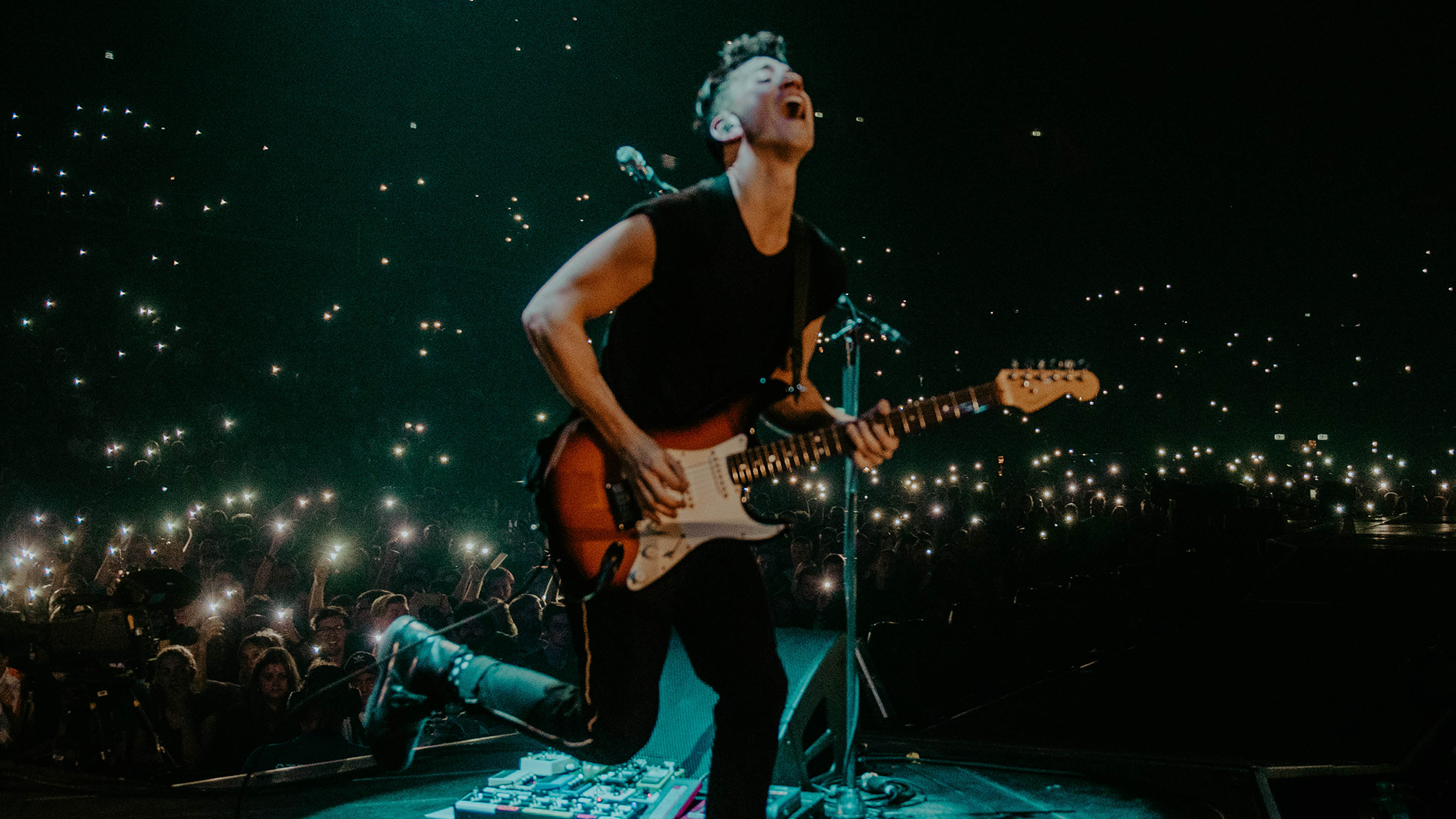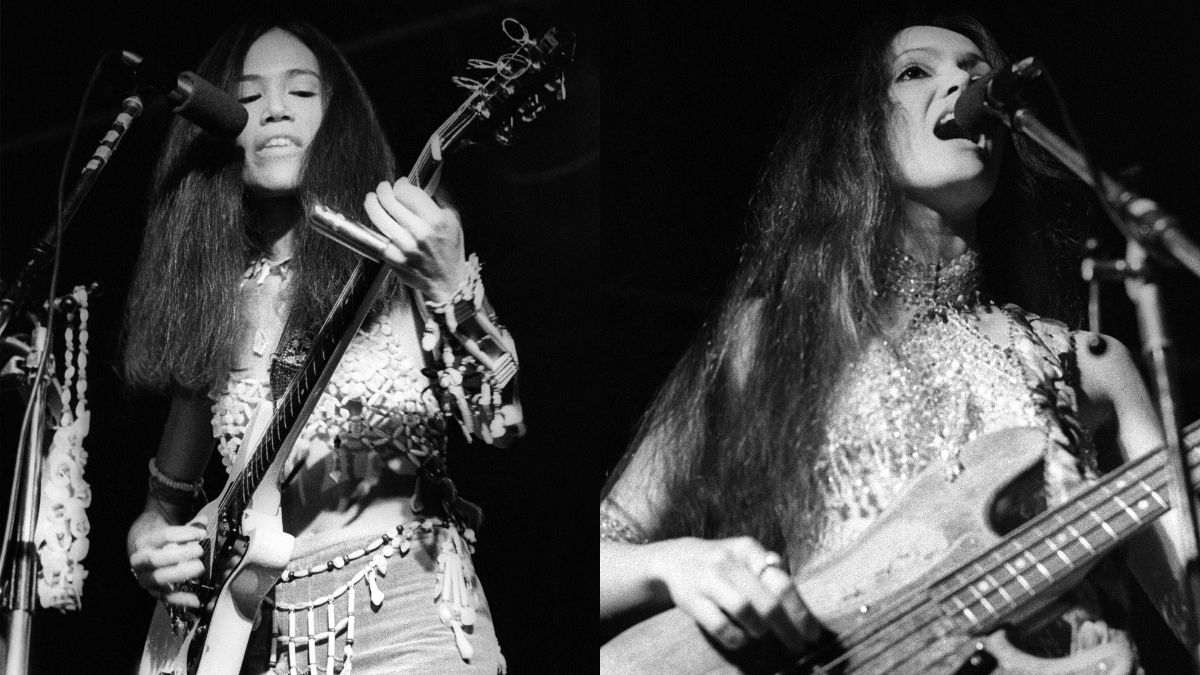Des Rocs: “A whole generation of people are concerned about recording guitars properly – and that's something that needs to go immediately!”
The New York songwriter blends classic rock 'n' roll showmanship with uber modern electronic stylings on his fierce debut LP, A Real Good Person in a Real Bad Place

All the latest guitar news, interviews, lessons, reviews, deals and more, direct to your inbox!
You are now subscribed
Your newsletter sign-up was successful
“I'm so obsessed with not being cool,” Des Rocs earnestly tells us from his Brooklyn studio.
“Chasing somebody else's expectation of what I should look like, or sound like, just has no place in anything that I do.”
It’s sort of hard to take from a dude who exudes confidence, charisma and well, coolness, in the way that Des Rocs, aka Daniel Rocco, does. But the above statements definitely check out, and that’s pretty evident just from the opening 10 seconds of his debut album alone.
A Real Good Person in a Real Bad Place is the end result of over a year in home studios – writing, recording, mixing, sound manipulating, tinkering with sequences and repeating ad nauseam – to deliver something sonically exceptional yet totally unpredictable.
Unpredictable in every sense, too. This is an artist who carved out his initial following with an energetic take on blues rock to arrive at a point where you could pick out reference points as disparate as Queen and Weezer, to the likes of Death From Above 1979 and even big beat acts like The Chemical Brothers. You don’t really know what’s going to come next on A Real Good Person...
While there is a whole lot going on, the guitar never really takes a back seat. Des is all about marrying real guitar tones with the new flavors – whether that’s intricately layered synths, heavily manipulated samples or breakbeat drum patterns – to create something that covers the breadth of his musical DNA.
Des talked us through the approach and inspiration that went into making A Real Good Person in a Real Bad Place.
All the latest guitar news, interviews, lessons, reviews, deals and more, direct to your inbox!
Just from the get go on Tick – it's such a weird way to start the album, such a weird kind of note progression that doesn’t instantly make sense – it seems very much the opposite of cynical.
“Oh, thank you very much. Yeah, I mean, I think those moments like that, there’s so many songs on the album. And just the lyrics itself, ‘a real good person in a real bad place’, just come from a spur of the moment, creative process where there's no internal critic, there's no, ‘Where does this fit into a playlist?’ or a radio station or anything like that. It's simply just music, just from what I've always loved.”
The stuff that's gone into the new album is quite different to some of the stuff from a couple years ago. Is that shaped by any particular influences?
“It's really not that it's like a thought out plan to change the sound. I'm just constantly evolving as a person and as an artist, and I view all the different styles and genres as just different colors in the palette, and I love to paint with all of them. I find the idea of just doing blues is so restrictive, I just want to expand and experiment and push what I can do artistically as a rock artist in the 21st century.”
Where a lot of the ideas start and get kind of fleshed out is on a very bare bones kind of set up – really just my pedalboard and a couple of guitars
The production on A Real Good Person is pretty superb. It’s all done at home, right?
“Well, it's been, it's either just me alone, or me and my friend from high school, and that's it. The first big chunk of the album was done in just my bedroom in the city, and then the second big chunk of the album was done in this little space here in Sunset Park, Brooklyn, where I am now.
“It’s all done on Logic [Pro X], and plugin wise, I use a lot of Eventide plugins. I have an [Eventide] H9 and I have all the stuff that's within Logic as well – and it's pretty bare bones.
“Then my buddy from high school, Gerry [Lange], who does a lot of the co-production on the album, has a bit more of a complicated rig where we’ll polish things up, but where a lot of the ideas start and get kind of fleshed out is on a very bare bones kind of set up – really just my pedalboard and a couple of guitars.”
What are the go-to pedals on your rig?
“Well, right now the things that have been like, indispensable since day one – I'm just looking at my pedalboard – it was just a Big Muff. That, to me, is everything. And I just have the Big Muff cranked and going through this 2007 M-Audio Box interface. I did the entire album [on that interface] – [it] was like $60 on Craigslist many years ago, and I'm just going directly into it.
“This is engineering sacrilegious speak, but it is how I make my music. I go directly in and I just clip the fuck out of it – I say if it ain't red, it ain't right! It makes editing the audio a bit more challenging, because the entire track is just a brick. But that's a lot of the guitar tones on the album.
“And then one thing that kind of spices it up is just a small MXR Carbon Copy delay that's kind of always on, just to provide a little width to the tone.”
Do you think that's kind of missing from a lot of mainstream music these days? Like a lot of those raw guitar sounds?
“Oh, absolutely. And I think because a whole generation of people are concerned about recording guitars properly – that is something that needs to go out the window immediately!
“When I'm recording guitars, I'm simply going by gut and just whatever feels cool and feels interesting to me. I'm simply looking for energy and vibe and I don't care about anything [being] technically played. If you solo the stems from all the songs in the records, you'd be mortified.”
All the volume knobs on all my guitars are completely neutered. They don't work because I will hit them live and cut my volume in half because my playing is kind of crazy
When it comes to guitars, do you have any preferences?
“I’m a bit of an everything guy in a weird way. I'm like a guitar mutt, and I think it's kind of reflective of my songwriting DNA as well. I'm obsessed with guitars that are maybe the not so sought after guitars.
“For me it's just all about a connection to the instrument. I do not care about the brand, I do not care how much it costs, I just care if I like it. I started off Des Rocs with these early '80s Japanese Squiers. I started out with this white one, and then we made another one that's black and then cloned all the exact mods that were done to it. So that's a perfect backup guitar live.
“And now during Covid, I had the time to experiment, and now there's a new girl in town, an equally obscure Japanese guitar from the early '80s. This is like an Ibanez Roadstar with a Floyd Rose and has a built-in extra gain boost, [and] a kill switch.
“Also all the volume knobs on all my guitars are completely neutered. They don't work because I will hit them live and cut my volume in half because my playing is kind of crazy. So it's all just dummy – on tone and everything else, all those knobs are just for show.”

Do you find your writing changes depending on what guitar you’re using? I always think all guitars have their own souls – they could be the same make and model, but they’ll feel a little different.
“Yeah. 100% I think the instrument that you're writing a song on or experimenting with an idea completely guides, not only the songwriting, but the whole recording and production of that song. Without a doubt they are integral, which is just this extra element of soul, like you said, that you don't get when you're just exclusively on MIDI instruments exclusively in the box.
“But I love using all of the above, they are all tools to be used. And just the combination of the human elements with these unbelievable in the box, super high-fidelity synthesizers and drum samples and stuff... to me, is the most exciting intersection.
“I think when it's people who say, ‘Oh, you need to make your rock record in the studio and just do it way X’, or the opposite, like ‘We have the best sounds in the world, let's just do it way Z’ – just being in those two silos is so creatively uninspiring, especially when you can just combine them all together and make something really unique. That’s the place that inspires me the most.”
- A Real Good Person in a Real Bad Place is out now on 300 Entertainment.
Chris is a contributor to Guitar World and MusicRadar with around 20 years of guitar playing experience – including writing for and recording various projects for around 15 of those. Outside of practical experience, he’s studied music throughout his life, with a particular focus on composition at university. He’s something of a 90s tragic and a sucker for anything with a groovy, metallic edge or psych and stoner vibes. Outside of music, he’s an avid cook, gardener, and rugby league lover.



